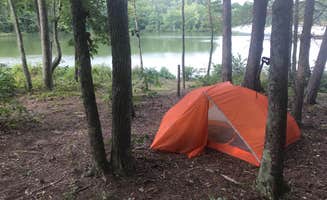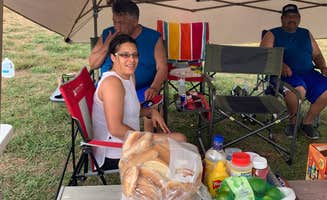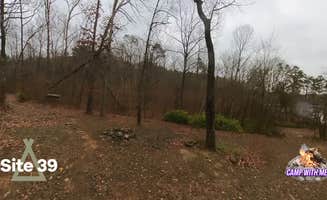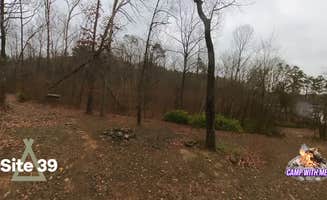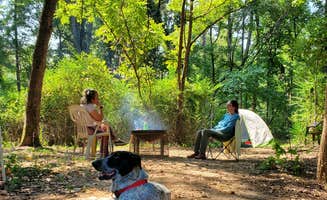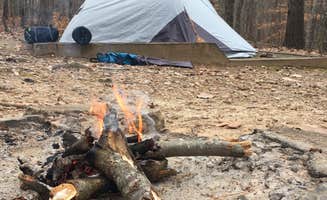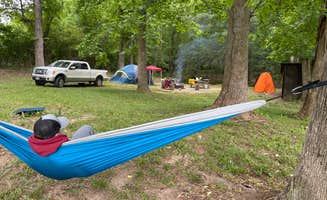Harrisburg, North Carolina camping destinations sit within the Piedmont region at approximately 650 feet elevation, providing access to both hardwood forests and lake environments. The area receives an annual rainfall of 43 inches with camping conditions that remain favorable from April through October when temperatures average between 65-85°F. Tent camping options include both established facilities and more remote locations.
What to do
Fishing at riverside sites: At Deep Water Trail Camp, campers can access prime fishing spots directly from their sites. One visitor noted, "Beautiful area, lots of space on the lower ground, gorgeous views from the higher ground, and some damn good fishing. My friends both caught a couple of channel cats." The camp provides direct river access with a short but steep walk down to the water.
Hiking with elevation: Crowders Mountain State Park Campground offers multiple trail options with varying difficulty levels. A visitor shared, "The trails are strenuous but views are amazing! Its definitely worth it and right outside town, not far out." Another camper noted, "My brother and I spent the day rock climbing. It was his first time climbing, and we were able to set up some beginner-friendly routes."
Creek exploration: The small waterways near Primitive Camping By the Creek provide natural cooling and exploration opportunities. "The campsite has a pretty creek and forest. On the campsite there is a lot of firewood to use, in a shed to keep it dry," reported one camper. These creek-side settings allow for wading and nature observation during warmer months.
What campers like
Solitude options: East Morris Mountain offers minimal facilities but maximum privacy. A camper explained, "Only three sites on this little out of the way fire trail. We go to the end of the road for complete privacy. No amenities other than a fire pit." This site provides a true wilderness experience for those seeking seclusion.
Year-round accessibility: Many camping areas remain open throughout winter months with milder temperatures than northern regions. One visitor at Lake Curriher Wilderness noted, "The gates close at 5pm during the fall/winter. Slightly around that time, the retired police chief came around to introduce himself and give his cell number. He is just up the street and was kind to offer this for extra safety."
Abundant firewood sources: Several campgrounds provide firewood for guests, either complimentary or for purchase. At Primitive Camping By the Creek, a camper reported, "The shed also has lots of tools such as an axe and rake. Also two trees near the entrance perfect size for a hammock." This saves campers from bringing their own wood supplies.
What you should know
Vehicle clearance requirements: Access roads to some campgrounds require suitable vehicles. At Deep Water Trail Horse Camp, a camper cautioned, "I would highly recommend 4WD if you're going all the way to the water sites. I attempted in my van and made it down to a sweet spot, but was stuck in the mud." Planning appropriate transportation prevents access difficulties.
Limited cell service: Most remote camping areas have minimal connectivity. At Deep Water Trail Horse Camp, a visitor reported, "Cell service is about 1 bar for Verizon and ATT," which can affect communication and navigation capabilities. Downloading offline maps before arrival is recommended.
Seasonal hunting impacts: Some campgrounds have different accessibility during hunting seasons. At East Morris Mountain, a camper noted, "This camp site is only open during hunting season," while others may have increased traffic during these periods.
Gate closure timing: Many established campgrounds have specific entrance gate hours. At Lake Curriher Wilderness, gates close at 5pm during fall/winter months, requiring campers to plan arrivals accordingly.
Tips for camping with families
Choose trails carefully: When bringing children to Crowders Mountain State Park, consider trail difficulty. One visitor advised, "The hike to the top was a little strenuous for smaller kids. The trails were also pretty crowded." Starting with shorter trails can build confidence before attempting more challenging routes.
Look for campgrounds with supervision: Some campgrounds offer additional security measures. A camper at Lake Curriher Wilderness shared, "The retired police chief came around to introduce himself and give me his cell number. He is just up the street and was kind to offer this for extra safety." This provides peace of mind for families with young children.
Pack water filtration systems: For campsites without potable water, like some areas at Lake Curriher Wilderness, preparation is key. A camper noted, "The water at our site is not working which is a bummer but we can use the water at the outside shower. It's non-potable but we have a filter and boil it before using it." This ensures safe drinking water for children throughout your stay.
Tips from RVers
Size-appropriate selections: Yates Family Camping accommodates RVs but with limitations. A visitor explained, "We've loved staying at Yates due to the flexibility and excellent communication of the owners. There aren't really any extras here but if you're just looking for reliable water/electrical/sewer and wifi near Charlotte this is a fantastic option." Confirm hookup availability before arrival.
Parking challenges: Many of the best tent camping near Harrisburg, North Carolina locations have limited parking for larger vehicles. A camper at Deep Water Trail Camp advised, "The upper landing is relatively small, my Dodge Ram fit with nothing being exposed on the road, but there was still plenty of campable space behind my truck." Measure your vehicle dimensions before attempting access roads.
Plan for service limitations: Basic amenities vary significantly at campgrounds around Harrisburg. A camper at Yates Family Camping noted, "Well not much here, no office or bathrooms. Water and electric and a dump station." Understanding these limitations helps with proper trip planning.


